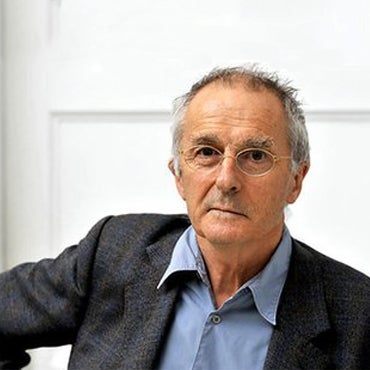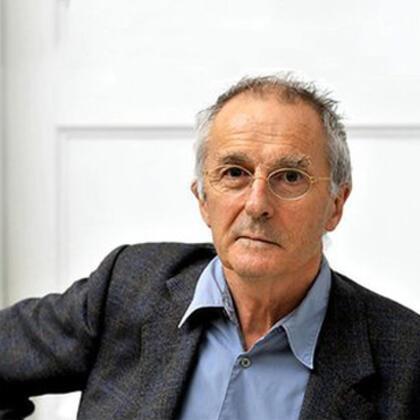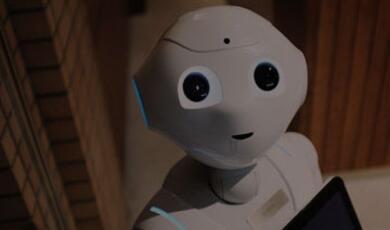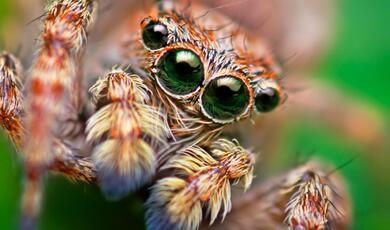Is Man Just Another Animal?
Share
- Details
- Transcript
- Audio
- Downloads
- Extra Reading
Many people agree with Gilbert and Sullivan that Darwinian man, though well behaved is nothing but a monkey shaved. The recent discovery that we share around 95% of our DNA sequence with our closest relative suggests that there may be some truth in that statement. A closer look shows that almost all the physical changes that have taken place in our bodies since the split from our common ancestor seven million years ago involve loss - we are bald, with weak muscles, and lack characteristics found in our relatives. Most remarkable, we are the only creature unable to survive on raw food. Eatan uncooked diet and in the end you will die. Our guts have been so reduced and our digestive enzymes so enfeebled that we depend on an external stomach, a frying pan or microwave, to stay alive. In just one organ, the brain, we have gained in comparison to the chimpanzee; and its improvements are striking indeed.
This lecture will explore why mankind is much more than just another animal.
Download Transcript
11 November 2013 Is Man Just Another Animal? Professor Steve Jones I am a serial plagiarist; have rewritten or at least updated the entire works of Charles Darwin. Now, have taken plagiarism further – my new book (out in May) - The Serpent’s Promise – an attempt to rewrite the Bible as if it were a scientific textbook. Do not mind if they burn the book as long as they buy it first. Many of the questions asked close to those asked by science – origin of universe, of life, of humans, origin of sex and age. Answers generally wrong but still spiritually satisfying to many. SLIDE - Title – from chimpanzee statue – Eritis sicut deus; then ye shall be as gods, knowing of good and evil. SLIDE - The Serpent in Eden – eat the fruit; Blake illustration. Science and spiritualism – very different ways of thinking; Interesting experience; have to say that did not make it any more religious than I was when I started, which is not religious at all. Also use William Blake as a uniting theme; wonderful illustrations – and also gives the book its epigraph What it will be Questiond When the Sun rises do you not see a round Disk of fire somewhat like a Guinea O no no I see an Innumerable company of the Heavenly host crying Holy Holy Holy is the Lord God Almighty - William Blake (1810) Notebook on a Vision of the Last Judgement Shows how the truly religious will see visions that are denied to the rest of us; which does not alter the fact that the scientific study of the Sun, or anything else, has a visionary quality of its own. Have to add, though, that I could not resist a second epigraph, from Oscar Wilde – Our only duty to history is to rewrite it! In fact, Wallace himself had a remarkably similar theory about the origin of humankind. Nobody disputes his brilliance as a biologist: Alfred Russel Wallace –famous for his cooperation with Darwin; wrote to Darwin in 1858; The Darwin-Wallace paper to the Linnean Society; the President’s response was the year had no “been marked by any of those striking discoveries which at once revolutionise, so to speak, the department of science on which they bear; it is only at remote intervals that we can reasonably expect any sudden and brilliant innovation which shall produce a marked and permanent impression on the character of any brand of knowledge, or confer a lasting and important service on mankind”. He was wrong! His biology is still bang up to date. Most famed for his bio-geographic work – Wallace’s Line; and that bang up to date – see paper in recent Science on a new analysis of the bio-geographic provinces of the world; now, of course, recognised as first proof of continental drift. Darwin was not much interested in philosophy or religion; he was very much a hard facts man. Wallace – far broader range of interests – set out the street plan of Llandrindod Wells early in his life; and how many people know his 1911 paper on “The use of flying machines in war”, or his proof from physics that the so-called canals of Mars could not be full of water? Most notorious, perhaps for his belief that evolution had limits when it came to explaining the human condition. Man had a spirit; that evolution was explanation of physical origin, but morals depended on something more: Man has “something which he has not derived from his animal progenitors—a spiritual essence or nature ... [that] can only find an explanation in the unseen universe of Spirit.” Later went even further: “I hold that there was a second act of creation; a giving to man, when he had emerged from his ape-like ancestry, of a spirit or a soul. Nothing in evolution can account for the soul of man. The difference between man and the other animals is unbridgeable.” Darwin dismayed; quoting T H Huxley: “not worse than the prevailing superstitions of the country”, by which he meant Christianity. In fact Wallace’s idea a common response to the The Origin: SLIDE - Orang-Utan Queen Victoria – painfully and disagreeably human. Jane Goodall - great ape project; 98% (in fact 95%) sharing – human rights; banana 50%; US Science 1 February? National Institute of Health insists that chimpanzee research must stop. To me irrational – akin to denial of what the theory of evolution can tell us. Remind ourselves what it is. Descent with modification – Genetics plus time. In fact an old idea – William Jones Language. Traces PIE – perhaps originated in Turkey. Numbers, family tree of Father. Dates of languages over a few thousand years. Wallace himself saw that – paper on theory of the origin of language. Notable that at the time there was creationist view; Tower of Babel. But Wallace felt that language had evolved from pre-human noises; pointed out comparative anatomy of language = in languages as different as English, French and Malay movement away words always were open-mouthed long-vowel – go, to, or allez, or gehe but movement towards where closed; come, from or de or von; thin, short vowels. ; mocked as the “Bow-wow and Pooh-pooh theory”; but will return to importance of language in human evolution at end of this talk. Now, we have the new comparative anatomy to sort out our relationships with our relatives; we can do with DNA what Darwin, Wallace and their contemporaries did with a scalpel (except that it demands a lot less skill to use a DNA sequencing machine than it does a scalpel). The language of the genes tells us where we come from. As most people know, humans and chimps share about 95% of their DNA sequence (not 98.8% as often said). However, that is very crude measure – and worth remembering that we share around half our DNA sequence with bananas. In fact family tree of all primates now made – ties us with flying lemurs, for example. Now much more sophisticated insights available with new sequencing technology; can sequence whole human DNA in a few hours rather than fifteen years. Remarkable general finding – when it comes to most bodily attributes, humans are a much diminished species in comparison with chimpanzees – have LOST hundreds of genes since the split from the common ancestor. We are the reduced chimpanzee, in physical terms at least. Not the ascent of Man, but the descent! Many examples, some familiar, others less so. Chimpanzees – hairy and strong. Hairlessness – an analogy with bald Mexican dogs and Sphynx cat – hair on top of head; also have reduced teeth – simple mutation. Perhaps evolved as humans on ground in tropics, overheating? Strength – Jane Goodall making a serious mistake. Several pet chimps have killed their owners. Know reason why – mutation in a single gene that makes myosin; compare attachment sites of jaw musculature –up to ten times stronger in other primates; humans have much smaller muscle cells throughout. Reduced ability to chew just the tip of the digestive iceberg. Chimp human diet differences - Homo sapiens is the dyspeptic ape. Gutless, with an intestine just half the length of theirs. We have small mouths, reduced teeth, weak jaws and a modest stomach. Each day chimps eat twice as much in relation to body weight as does a typical man or woman. That calls for chewing. Humans spend little more than an hour a day at the pastime while chimps spend six times as long. We get away with decayed tastes and feeble guts because of a unique talent: cooking. A saucepan is an external stomach. With its help Homo sapiens has become the ape that bakes, barbecues, bastes, blanches, boils, brazes, brews, broils, browns and (sometimes) burns. Brillat Savarin - 1825 book The Physiology of Taste: “A man does not live on what he eats … but on what he digests.” Cooking ensures that its raw material is in part broken down before it gets into the mouth. The contents of the human skull are three times bigger, but the intestine a quarter shorter, than those of our closest relative. Men and women have expensive, large and efficient brains but cheap, reduced and ineffective guts with which to provision them. The saucepan squares that energetic circle. Man cannot live by raw food alone, although plenty of people have tried. Will starve to death in the end. We are also sexually much less impressive than our relatives – note size of testes on this elderly chimpanzee compared to Michelangelo’s David (check size of thumb). Much more sperm, more sperm competition (and human sperm count in some places such as France now half what it was in the 1950s). Also true in the penis department, where we are spineless – chimpanzees have spines on penis – perhaps to penetrate plug left by previous mate – but we do not. Molecular biology of this – deletion of an androgen (male hormone) receptor. In many ways, humans a feminized chimpanzee! In fact loss of penis spines is trivial; new work reveals that this deletion of genes in humans is far more widespread than anyone imagined; more than 500 deletions found – remove lengths of DNA. Remarkably, all found in non-coding regions; what was once, foolishly, referred to as “junk”; but now known to be the home of control centres that switch on and off the protein-coding genes themselves. Particularly involved in the steroid hormones involved in sex and also in immune system. Average at around 3000 DNA bases long. So, if we are so diminished compared to the chimpanzee, how come we have done so well? Can map spread across the world; had filled the Old World by c40 thousand years ago, filled New World twenty thousand years ago – while our close relatives have stayed in their homelands. Once again the genes give a clue; mt patterns in humans (red) versus other primates – difference between two gps of chimps 200 miles apart more than that between humans of Papua New Guinea and Northern Europe. Have evolved in the mind, not the body. Can see enormous increase in brain size since human-chimp common ancestor; brain now the most expensive organ in the body. Part of the increase has to do with a shift in diet, with cooking squaring the circle of powerful brain versus feeble gut. Many more cortical neurones than anything else – twice as many as chimpanzees, for example and more even than whales although their brains, like their bodies, are bigger. Interestingly, since Neanderthals, human brain size has decreased; and it certainly has not increased since modern humans appeared on earth over a hundred thousand years ago. What makes us human is unique – speech; a new form of genetics. Verbal dyspraxia; genes – the language of biology, evolution – its grammar; these kids cannot cope with grammar. FOXP2 mutation – this is an amino acid mutation, 2 shifts on way to Homo sapiens. Now know that mainly acts as a transcription factor, regulating the expression of other genes. For example, we now know that FOXP2 can down regulate (turn down the expression of) CNTNAP2 (another gene located near FOXP2 in human chromosome 7, loci 35 and 36), and CNTNAP2 variants can cause a delayed speech acquisition in children. One embarrassment – Neanderthal has human-like version of FOXP2 – has been used to suggest that it could speak. In fact, very recent work, suggests that regulatory – control – change has been at work again. Detailed look at DNA sequence in part of the FOXP2 gene region – humans have unique set of variants not present in anything else, including Neanderthals. Seem to have spread through the population in not much more than the past 100 000 years; associated with the insertion of a particular sequence unique to humans that acts as a receptor to a control agent that greatly increases the expression of FOXP2. Interesting – FOXP2 close to genes whose damaged forms implicated in autism and schizophrenia – says more about our own unique mental status? [autists and belief in God?]. Likely that Neanderthal, then, could not speak; if came to sit next to me on tube at Camden Town, would not notice – covered in fur, grunting; etc etc. But consider it from his point of view – utterly alien. Unique attribute – speech. Power of speech – a new kind of inheritance And that leads to the Wallace problem; man’s unique spirituality; story from my father. Analogy from language: man goes into a Szechuan restaurant in Aberystwyth and is served by a Chinese waiter who speaks perfect Welsh. Beckoning the boss, the customer asks where he found hime: “Keep your voice down, he thinks he’s learned English!” ie, from a Chinese speaker’s point of view, Welsh and English are mere dialects of each other. They are members of the Indo-European group of languages, descended from a common ancestor. Only way to test how distinct is to put into context, with Chinese as a separate group with which Welsh and English can be compared. The difference between the two is, in global context, tiny. If an object is one of a kind, it is impossible to know where to put it. The problem with the mind, or any uniquely human attribute, is simple: it is unique. It is the problem of language: if there were but one world tongue (as, with the spread of English, there may one day be) it would be impossible to tell from whence it came. Spirituality is the same: we all have one, but, as far as we can tell, nothing else does. Relevant to creationism; I have no problem in phrasing this that as “at some time an evolving line gained a soul which has no genes and leaves no fossils”. A question beyond science for science has no means of disproving it. That is also the problem with the Wallace claim about spirituality; cannot be explored with the methods of science as no other animals, as far as we can tell, have it. So, I am with Darwin rather than Queen Victoria; but the more we learn about the shift in human evolution from body away to mind the less similar we seem to chimpanzees; in fact genetics, in spite of the fears of Wallace makes me feel far MORE human than I did before. CHIMPANZEE STATUE – ERITIS SICUT DEUS WILLIAM BLAKE ADAM AND EVE WALLACE NEW BIOGEOG MAP BLAKE QUOTE ON SUN REAL SUN WALLACE SPIRIT QUOTE QUEEN VICTORIA AND ORANG BUSH AND CHIMP JUST ANOTHER ANIMAL MR GOORILLA JANE GOODALL TOWER OF BABEL WILLIAM JONES NUMBERS FAMILY TREE OF EUROPEAN LANGUAGES WITH DATES TURKEY THE HOME OF EURO LANGUAGES? WORLD LANGUAGE TREE PRIMATE FAMILY TREE CHIMP – HAIRY, BIG TEETH HAIRLESS DOG, CAT CHIMP KILLS OWNERS MYOSIN MUTATION HUMANS JAW MUSCLES PRIMATES CHIMP HUMAN DIET CHIMP HUMAN GUT JOY OF SEX – DAVID AND CHIMP SPERM COUNT DECLINING CHIMP PENIS SPINES ANDROGEN RECEPTOR LOSS NIT-PICKER CHIMP NIT-PICKER HUMAN ORIGIN OF CLOTHES DIAGRAM MASSIVE DELETIONS IN HUMAN GENOME OVER-REP OF STEROID HORMONES – FEMINIZED CHIMP! MIGRATION PATHS ACROSS OLD WORLD HUM CHIMP MITO DIFFERENTIATION CHIMP HUMAN BRAIN SECTIONS BRAIN SIZE WITH TIME BRAIN SIZE AND DIET NO OF CORTICAL NEURONES BRAINS AND CULTURE AGAIN VERBAL DYSPRAXIA FOXP2 MOLECULE FOXP2 TREE NEANDERTHAL UNIQUE HUMAN TRANSCRIPT SEQUENCES BINDING SITE IN HUMAN FOXP2 FIT OF FOXP2 AND AUTISM © Professor Steve Jones, 2013
This event was on Mon, 11 Nov 2013
Support Gresham
Gresham College has offered an outstanding education to the public free of charge for over 400 years. Today, Gresham plays an important role in fostering a love of learning and a greater understanding of ourselves and the world around us. Your donation will help to widen our reach and to broaden our audience, allowing more people to benefit from a high-quality education from some of the brightest minds.


 Login
Login







